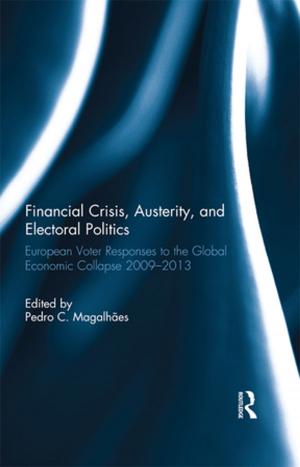Coping with Crisis: Europe’s Challenges and Strategies
Nonfiction, Social & Cultural Studies, Political Science| Author: | ISBN: | 9781317598763 | |
| Publisher: | Taylor and Francis | Publication: | March 17, 2016 |
| Imprint: | Routledge | Language: | English |
| Author: | |
| ISBN: | 9781317598763 |
| Publisher: | Taylor and Francis |
| Publication: | March 17, 2016 |
| Imprint: | Routledge |
| Language: | English |
How has the economic and financial crisis that started in 2007 affected European integration? Observers have been speculating about whether the crisis will ultimately lead to a strengthening or weakening of the European Union. This book studies the effects of the crisis on EU policy-making and institutional arrangements on one hand, and citizens’ EU attitudes and political parties’ electoral strategies on the other. It concludes that, at least in the short run, the crisis has overall created an opportunity for European integration rather than an obstacle. First, it has triggered events of proposed and actual far-reaching policy and institutional change. Second, negative effects on public opinion have not (yet) systematically translated into tendencies of stagnation or disintegration. The book brings together established scholars of European integration whose diverse research expertise contributes to an improved theoretical and empirical understanding of how the economic and financial crisis has affected EU policies, institutions and citizens.
This book was published as a special issue of the Journal of European Integration.
How has the economic and financial crisis that started in 2007 affected European integration? Observers have been speculating about whether the crisis will ultimately lead to a strengthening or weakening of the European Union. This book studies the effects of the crisis on EU policy-making and institutional arrangements on one hand, and citizens’ EU attitudes and political parties’ electoral strategies on the other. It concludes that, at least in the short run, the crisis has overall created an opportunity for European integration rather than an obstacle. First, it has triggered events of proposed and actual far-reaching policy and institutional change. Second, negative effects on public opinion have not (yet) systematically translated into tendencies of stagnation or disintegration. The book brings together established scholars of European integration whose diverse research expertise contributes to an improved theoretical and empirical understanding of how the economic and financial crisis has affected EU policies, institutions and citizens.
This book was published as a special issue of the Journal of European Integration.















